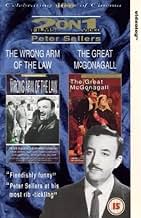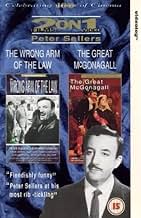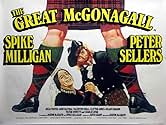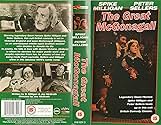William Topaz McGonagall, the world's greateset poet. Unfortunately the whole of the rest of the world disagreed. His talent made him a sort of Victorian Chris Evans but without the cash.William Topaz McGonagall, the world's greateset poet. Unfortunately the whole of the rest of the world disagreed. His talent made him a sort of Victorian Chris Evans but without the cash.William Topaz McGonagall, the world's greateset poet. Unfortunately the whole of the rest of the world disagreed. His talent made him a sort of Victorian Chris Evans but without the cash.
- Director
- Writers
- Stars
Charlie Young Atom
- Postman
- (as Charlie Atom)
- …
Lewis Alexander
- Member of Royal Entourage
- (uncredited)
Malou Cartwright
- Barmaid
- (uncredited)
Walter Henry
- Theatre Audience
- (uncredited)
Aileen Lewis
- Member of Royal Entourage
- (uncredited)
Tony Mendleson
- Theatre Audience
- (uncredited)
Reg Thomason
- Theatre Audience
- (uncredited)
John Wilder
- Theatre Audience
- (uncredited)
- Director
- Writers
- All cast & crew
- Production, box office & more at IMDbPro
Featured reviews
Spike Milligan never got an even break. After he redefined comedy and pop culture on the radio with his scripts and performances on "The Goon Show," driving himself in the process to a nervous breakdown, he had to watch while his flabby "Goon Show" partner Peter Sellers became a film comedy superstar. By the time Milligan was well enough to try his own hand at film acting, it was already the 1970s and he had become passe.
His biggest stab at cinematic glory, "The Great McGonagall," reveals he might have gotten out of the looney bin a little too early. Portraying a talentless Scottish poet, Milligan overacts his way through a punchy script he co-wrote with director Joseph McGrath. Sellers appears too, as Queen Victoria, and ironically the two former Goons - who used to play dozens of roles apiece each week on the radio - stick to single characters while other actors, including Victor Spinetti of "A Hard Day's Night" and "Help!," are given the task of performing multiple parts.
It's a strange film that breaks down in the second half, much the way Milligan must have in real life. Still, the script offers hints of the great Goonish humor that launched a comedy revolution.
"Knock, knock." Who says that? "A wee postman who canna reach the knocker," is the reply.
There's strange bits of self-indulgence, too. Scenes are broken up by actors shoving pies in each other's faces, and at one point Milligan forgets his line, whereupon the cameras continue to run as the director and other actors coach him on what to say. It's very bizarre, and might even be fascinating, but for the fact that the story on screen is too slender to brook such diversions.
Sellers, the one name actor in this film, is given little to do as Queen Victoria but perform reaction shots, and occasional witty lines like "Does anyone know a good solicitor" when her Prince Albert locks lips with a male messenger. The early 1970s were a dry period for Sellers, and "The Great McGonagall" was no exception. Albert wears a kilt but otherwise dresses like Hitler, a tiny joke which Milligan and the filmmakers beat into the ground. Valentine Dyall, a dead ringer for Ian McKellen, comes off best in a series of roles that include Alfred Lord Tennyson and a Zulu messenger.
"The Great McGonagall" no doubt amused its makers, who thought it would be funny to send up a bad poet endlessly mocked by fate and society, but on screen it's no "Ed Wood" of poesy. Its too disjointed, too mean-spirited. It's the product of a man who has seemingly given up on life, and wants to hit his audience upside the head with its sordid futility. Milligan, a comic genius who never got his due on screen, had reason to be depressed, but you do not. Give this a miss.
His biggest stab at cinematic glory, "The Great McGonagall," reveals he might have gotten out of the looney bin a little too early. Portraying a talentless Scottish poet, Milligan overacts his way through a punchy script he co-wrote with director Joseph McGrath. Sellers appears too, as Queen Victoria, and ironically the two former Goons - who used to play dozens of roles apiece each week on the radio - stick to single characters while other actors, including Victor Spinetti of "A Hard Day's Night" and "Help!," are given the task of performing multiple parts.
It's a strange film that breaks down in the second half, much the way Milligan must have in real life. Still, the script offers hints of the great Goonish humor that launched a comedy revolution.
"Knock, knock." Who says that? "A wee postman who canna reach the knocker," is the reply.
There's strange bits of self-indulgence, too. Scenes are broken up by actors shoving pies in each other's faces, and at one point Milligan forgets his line, whereupon the cameras continue to run as the director and other actors coach him on what to say. It's very bizarre, and might even be fascinating, but for the fact that the story on screen is too slender to brook such diversions.
Sellers, the one name actor in this film, is given little to do as Queen Victoria but perform reaction shots, and occasional witty lines like "Does anyone know a good solicitor" when her Prince Albert locks lips with a male messenger. The early 1970s were a dry period for Sellers, and "The Great McGonagall" was no exception. Albert wears a kilt but otherwise dresses like Hitler, a tiny joke which Milligan and the filmmakers beat into the ground. Valentine Dyall, a dead ringer for Ian McKellen, comes off best in a series of roles that include Alfred Lord Tennyson and a Zulu messenger.
"The Great McGonagall" no doubt amused its makers, who thought it would be funny to send up a bad poet endlessly mocked by fate and society, but on screen it's no "Ed Wood" of poesy. Its too disjointed, too mean-spirited. It's the product of a man who has seemingly given up on life, and wants to hit his audience upside the head with its sordid futility. Milligan, a comic genius who never got his due on screen, had reason to be depressed, but you do not. Give this a miss.
There is a classic volume edited by Wyndham Lewis and another entitled "The Stuffed Owl: An Anthology of Bad Verse". The book illustrated the worst poets and poetry (in the opinion of the editors) in modern English literature (Shakespeare and his contemporaries, and Medieval masters like Chaucer, were not included). Incredibly the editors not only included poets who were deservedly forgotten (the bland and self-satisfied Martin Tupper, or Edward Foote, who footnoted his poems to verify what he meant, or Poet Laureates like Alfred Austin) some of the great poets slipped too. Wordsworth, Poe, Byron, Tennyson, Longfellow (for "Excelcior") were in the book. I recommend it for people who want to enjoy the pratfalls of poesy (which can be very odd indeed).
Oddly enough William MacGonigal is not included in the collection. Yet he is generally chosen as the example of the worst poet of Victorian Britain. He was the only one who never realized it. He was a dreamer - one day he was in bed and suddenly realized he wanted to be a poet...a great poet. He then proceeded to write poetry, and would do so until he died. There was absolutely nothing anyone of his serious contemporaries ever saw in his work to grant it merit. He certainly was not in the same category of Tennyson or Wordsworth or Byron (despite their occasional lapses). Yet he actually tried to become poet laureate. Given that (after Tennyson died in 1892) Alfred Austin finally got chosen (Wilde, Kipling, and William Morris were not considered politically correct enough for different reasons - Austin was a good Tory policy propagandist), MacGonigal could have served that political occasion job. He would have enjoyed it.
Today, actually, his poetry sells well (some say it sells better than Tennyson, Matthew Arnold, or Robert Browning). It has a beguiling beat, likened to calypso in rhythm. His fairly simple line of English vocabulary is quick to grasp among people struggling to learn our language. And (unlike Tennyson and most of the others) a movie was made about his life. Spike Milligan finally got the lead role in his career (remember "Postman's Knock" - I suppose not) that was worth remembering. Sellers was given an interesting cameo as Queen Victoria. Not a great film, but an interesting one.
Oddly enough William MacGonigal is not included in the collection. Yet he is generally chosen as the example of the worst poet of Victorian Britain. He was the only one who never realized it. He was a dreamer - one day he was in bed and suddenly realized he wanted to be a poet...a great poet. He then proceeded to write poetry, and would do so until he died. There was absolutely nothing anyone of his serious contemporaries ever saw in his work to grant it merit. He certainly was not in the same category of Tennyson or Wordsworth or Byron (despite their occasional lapses). Yet he actually tried to become poet laureate. Given that (after Tennyson died in 1892) Alfred Austin finally got chosen (Wilde, Kipling, and William Morris were not considered politically correct enough for different reasons - Austin was a good Tory policy propagandist), MacGonigal could have served that political occasion job. He would have enjoyed it.
Today, actually, his poetry sells well (some say it sells better than Tennyson, Matthew Arnold, or Robert Browning). It has a beguiling beat, likened to calypso in rhythm. His fairly simple line of English vocabulary is quick to grasp among people struggling to learn our language. And (unlike Tennyson and most of the others) a movie was made about his life. Spike Milligan finally got the lead role in his career (remember "Postman's Knock" - I suppose not) that was worth remembering. Sellers was given an interesting cameo as Queen Victoria. Not a great film, but an interesting one.
Interesting in an history of British comedy sense. It has a Goon Show cast does Monty Python skit feel. Unfortunately, it takes a concept that would have been appropriate for a five minute skit and stretches it out an additional hour and a half. A fine supporting performance by Peter Sellers and sporadic gratuitous female nudity (while appreciated) are insufficient to save this from being an albeit quirky and unique but simultaneously mediocre and repetitive low budget comedy.
As an aside, the video copy of this film that I purchased features a full cover picture of Peter Sellers and in the short synopsis on the reverse states that Sellers stars as The Great McGonagall. For the benefit of those of you who have yet to see the film, this is entirely incorrect. Peter Sellers plays the relatively small roll of Queen Victoria and Spike Milligan stars as McGonagall.
As an aside, the video copy of this film that I purchased features a full cover picture of Peter Sellers and in the short synopsis on the reverse states that Sellers stars as The Great McGonagall. For the benefit of those of you who have yet to see the film, this is entirely incorrect. Peter Sellers plays the relatively small roll of Queen Victoria and Spike Milligan stars as McGonagall.
This film is totally hilarious. The film is a loose adaptation of the life of William "Topaz" Mcgonagall, said to be the worst poet circa 1890. Milligan is excellent, playing the role with great determination. Spinetti is hilarious in at least 5 different roles. McGrath uses guerrilla filming tactics in his direction, sort of similar to his earlier film "The Magic Christian" also with Sellers, and Milligan. Peter Sellers pulls a sort of "Mouse that Roared" revival, this time playing the role of Queen Victoria. The VHS copy that I own is at least 25 years old. Hopefully Anchor Bay, Crtierion, or some other company will take note of the value of this film, and give it the release that it deserves.
This movie uses the poems of William McGonagall in form of theater and fantasies to tell the story of this most famous bad verse poet who completely left his day job to become a poet and perform for Queen Victoria.
This movie is not for all tastes and definitely not a commercial type one, but if you can get into the subject and the style its hilarious!
This movie is not for all tastes and definitely not a commercial type one, but if you can get into the subject and the style its hilarious!
Did you know
- TriviaWilliam Topaz McGonagall was, in fact, a real poet. He is considered the worst poet ever, and Spike Milligan and Peter Sellers read his poems to one another frequently.
- Quotes
William McGonagall: Is anything worn under the kilt?
John Brown: No, everything is in working order.
- SoundtracksThis Goodbye
Written by Spike Milligan
Details
- Release date
- Country of origin
- Language
- Also known as
- Den store McGonnagal
- Filming locations
- Production companies
- See more company credits at IMDbPro
- Runtime
- 1h 35m(95 min)
- Sound mix
- Aspect ratio
- 1.37 : 1
Contribute to this page
Suggest an edit or add missing content































